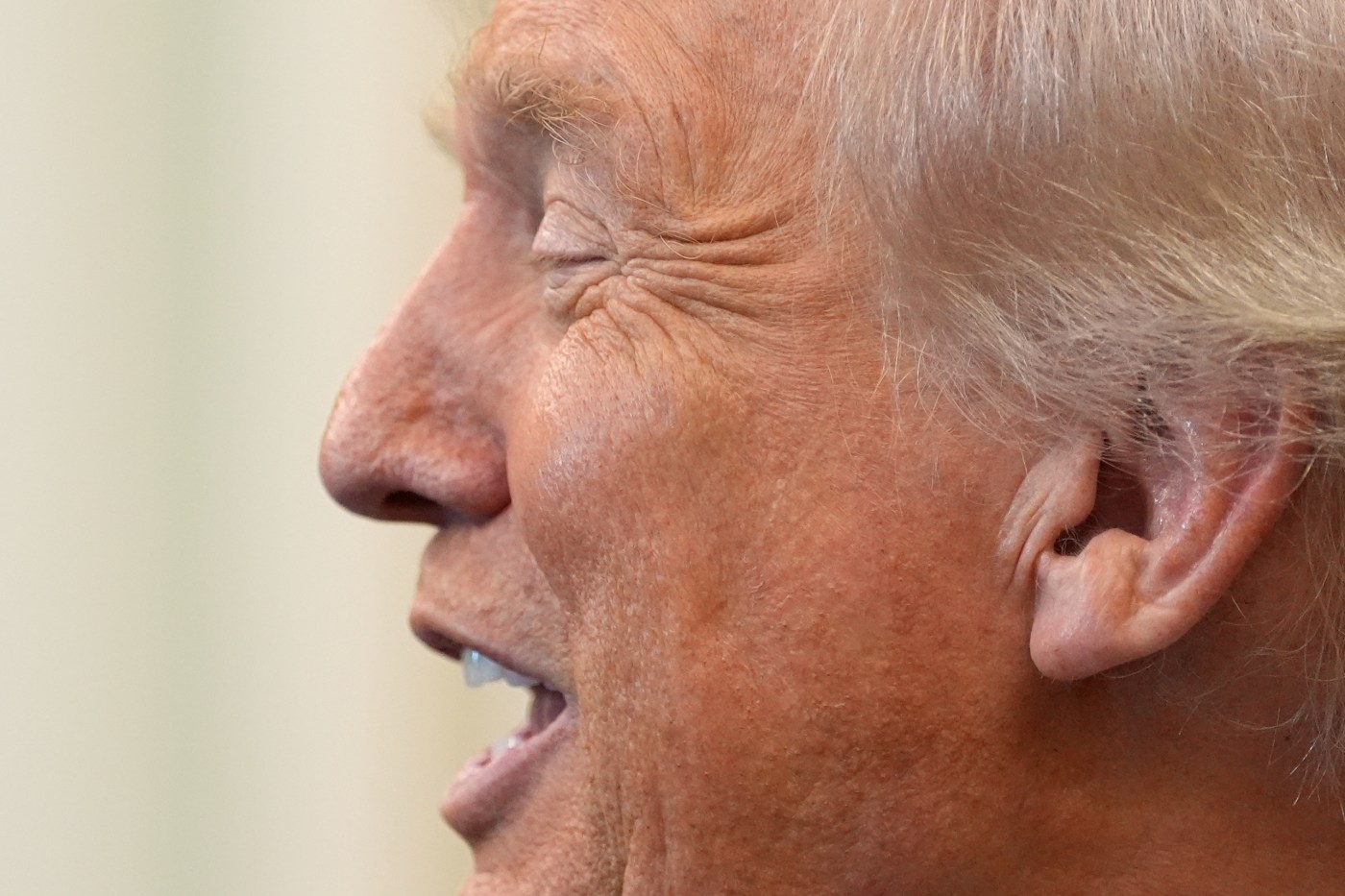
WASHINGTON — President Donald Trump has long wielded sharp rhetoric as a political weapon — who can forget “Crooked Hillary” Clinton or “Sleepy Joe” Biden? But in his second term, the president’s language and that of his top aides has taken an even darker turn.
Rather than just suggesting Democrats and other opponents are incompetent, Trump and his supporters have increasingly cast their critics, including other elected officials, as illegitimate and even dangerous. Just in the past few weeks, they have described Democratic senators who continue to reject a Republican budget deal as negotiating like “terrorists” and said those attending Saturday’s nationwide anti-Trump “No Kings” rallies “hate America.”
The president himself went so far as to say last week that Democrats follow “the devil’s ideology.”
Perhaps nowhere in the country has Trump focused his efforts to discredit his opponents more than in the Chicago area. There, his Department of Homeland Security called some protesters in suburban Broadview “antifa-aligned rioters,” referring to the nebulous but global anti-fascist movement the administration recently designated as a domestic terrorist organization.
Trump and other officials routinely ridicule and mock local and state politicians, with the president himself calling for Democratic Gov. JB Pritzker and Mayor Brandon Johnson to be jailed for undermining the Trump administration’s immigration efforts.
Trump and his Republican supporters justify their words by saying Democrats have amped up their own rhetoric. They point to examples of prominent Democrats vilifying federal Immigration and Customs Enforcement agents by referring to them as “slave patrols,” “fascists,” or “the Gestapo,” the secret Nazi police.
Pritzker has been particularly outspoken. The Jewish governor, in a joint address to state lawmakers in February, compared the Trump regime’s early actions to the rise of the Nazi Party in 1930s Germany.
But experts who study the backsliding of democracy around the world say the marked change in tone, along with aggressive tactics from the Trump administration, follows well-established patterns that authoritarian leaders in places like Hungary, Russia, Turkey, and Venezuela used as they consolidated power.
“There has certainly been a shift since the first Trump administration, and even since the beginning of this Trump administration,” said Michael Albertus, a political science professor at the University of Chicago who studies democracy and dictatorship.
Albertus said targeting free speech is common in countries where democratic institutions have been weakened. “There’s no question that considering protest, not as a form of patriotism but rather as a form of illegitimate dissent, is very common among regimes or governments that have leaders with authoritarian tendencies,” he explained.
But in the U.S. today, there is no evidence of a widespread conspiracy against the government, Albertus said.
“It’s not like you have a large-scale, organized set of agitators that are specifically attempting to use violence at these occasions. These are peaceful protests about policies that are being implemented on the ground,” he noted.
He added that the Trump administration is “tilting the democratic playing field” by demonizing political opponents and ignoring legal constraints on executive power.
“It’s still conforming with many political and legal norms to keep the government operating smoothly, even as it makes moves that are testing the boundaries of the rule of law and that move beyond the boundaries of law,” Albertus said, which is a common feature of “competitive authoritarian” regimes.
Grossman, a University of Illinois professor, said the Trump administration’s approach during the president’s second term has been that there is “no space for political opposition,” which is “why political scientists and others are using terms like ‘authoritarianism’ and ‘fascism’ or other words.”
He pointed to a famous saying from political scientist Adam Przeworski: “Democracy is a system in which parties lose elections.”
“Parties that lose an election,” Grossman explained, “will take their case to the people and (try to) win the next election. Trump and the Republicans have not been operating that way at all.”
When Miller, the Trump advisor, dismisses the Democratic Party as a “domestic extremist organization,” he’s trying to shift the mindset of the public, the courts, Congress, and the media to act as if the country is at war, Grossman said.
“When the way people are operating is in a war mentality, that gets rid of a lot of what we would consider the ‘legal niceties’ of peacetime. The ‘you’ve got to kill people before they kill you’ logic takes over,” he added.
And when Trump, Miller, and other administration officials repeatedly lie about the state of affairs in Chicago, Portland, or Washington, D.C., Grossman said they’re trying to shift public perception.
“You get stories about ‘What can Trump do with the Insurrection Act?’ and that type of discussion,” Grossman said, “as opposed to what it should be: ‘The Insurrection Act doesn’t apply at all.’”
Grossman also dismissed the idea that comparing ICE agents to the secret police, or Gestapo, of Nazi Germany amounts to a threat. Politicians frequently use over-the-top historical comparisons to attack their enemies, he noted, including Trump, who during last year’s presidential campaign called former Vice President Kamala Harris a “communist,” a “Marxist,” and a “fascist.”
Besides, Grossman said, Trump’s Make America Great Again movement does align with both historical and theoretical definitions of fascism.
“The United States has not had a secret police before,” he said. “Hiding their faces and violating rights and claiming that they can do all of this without needing warrants, without following proper legal procedures and due process, that is some real SS stuff. That’s an appropriate historical analogy even if it’s not identical.”
“You want to make sure that those voting in elections feel safe and secure to go to the polls, and in the same way you want the ability to have protests and to do it freely in a way that reflects the right of Americans to speak out,” he said. “When people feel like that is threatened, it can have a chilling effect for people to engage in their democracy.”
— Vock is a freelance reporter.
https://www.chicagotribune.com/2025/10/19/trump-language-opponents-illinois/


